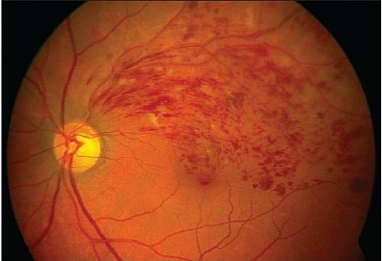 |
| Retinal vein occlusion may be a bellwether of future systemic cardiovascular events. Photo: NIH. Click image to enlarge. |
Editor’s Note: As part of our “Year in Review” retrospective, we’ve selected the top 30 news stories of the year and are re-sharing them as we close out 2023. Follow along as we count down to number 1!
This story was originally published September 8, 2023.
No. 1 biggest news story of 2023:
Retinal vein occlusion (RVO) is associated with cardiovascular risk factors, and it’s possible that such incidents may also carry predictive value for a future subsequent vascular event or mortality risk. In a new study, researchers examined rates of stroke, myocardial infarction (MI), deep vein thrombosis, pulmonary embolism and death in patients after RVO and found patients an increased risk of these vascular events.
A total of 45,303 patients with diagnosis of RVO and a control group of patients with cataract were included. Patients were excluded if they had history of stroke, MI, deep vein thrombosis or pulmonary embolism within two years of diagnosis of RVO or cataract.
With a closely matched control population to assure parity in age, gender, ethnicity, race and systemic comorbidities of diabetes, hypertension and hyperlipidemia, this study found increased risks of death and subsequent vascular events, including stroke and MI, after RVO.
“Overall, our study shows increased risk of subsequent vascular events such as death, stroke and MI after RVO compared to a control population at follow ups of one, five and 10 years,” the authors wrote in their paper for American Journal of Ophthalmology. “There was minimal risk of subsequent deep vein thrombosis or pulmonary embolism in RVO patients, except for a mildly elevated risk of deep vein thrombosis at one year compared to the control population, though this trend was not seen at five or 10 years of follow-up.”
Examining central RVO and branch RVO separately may be needed to explore the underlying mechanism, as both showed elevated risk of death when comparing these patients. “We performed subgroup analyses and found a matched analysis of patients with CRVO compared to BRVO showed higher risk of death for patients who experienced CRVO at one year, five years and 10 years,” they noted.
Overall, optometrists and ophthalmologists “should be aware of elevated risk of death and vascular events including MI or stroke in patients presents with RVO,” the researchers concluded. “Long-term systemic evaluation for cardiovascular risk factors in conjunction with primary care providers for patients who present with BRVOs and CRVOs is imperative to minimize subsequent vascular events.”
Wai KM, Ludwig CA, Koo E, et al. Risk of stroke, myocardial infarction, deep vein thrombosis, pulmonary embolism and death after retinal vein occlusion. Amer J Ophthalmol. August 23, 2023. [Epub ahead of print.] |

